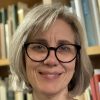This article is more than 5 years old.
“Preserve the Humanities! Special Collections as Liberal Arts Laboratory” was the theme for the annual conference of the Rare Books and Manuscripts Section of ACRL, held this year in Oakland, CA during the week preceding ALA. Sessions at the Oakland conference center and the Berkeley campus explored the idea of special collections as source material for humanities research, and librarians as both facilitators of and participants in this research.
Many of the sessions were about planning and providing instruction in special collections. I participated in one on undergraduate instruction (along with librarians from Johns Hopkins and Auburn), giving a presentation on how I developed and taught ZSR’s History of the Book (LIB260) class. Our session drew a standing-room-only crowd, which I think attests to the fact that instruction has become a major priority for special collections librarians and archivists in recent years.
There were of course more very interesting concurrent sessions than I could attend (without a time-turner). One proposed a “User-Driven Manifesto” and offered case studies of how a user-centered culture can be implemented in special collections outreach. Another session, “Bridging Borders between Special Collections and Area Studies,” discussed the challenges of collecting and outreach for collections of materials from non-western cultures.
I particularly enjoyed the second plenary session, “Special Collections Libraries as Liberal Arts Laboratories.” Rachel Sagner Buurma from Swarthmore gave an account of her ongoing Early Novels Database project, in which undergraduate researchers create detailed metadata for works of 18th century fiction. And Kimberly Christen Withey described the Plateau Peoples project at Washington State University. This digital portal for archival materials of Indians of eastern Washington and surrounding areas uses Murkutu, a CMS software designed specifically for digital heritage collections of indigenous communities.
As always, I came away from RBMS with many new ideas and a renewed appreciation for the innovative work being done by special collections librarians across the country!

1 Comment on ‘Megan at RBMS’
How interesting that there is a specific CMS for indigenous communities digital heritage projects!